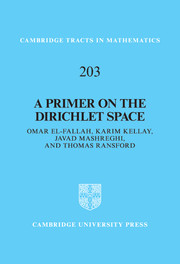Book contents
- Frontmatter
- Dedication
- Contents
- Preface
- 1 Basic notions
- 2 Capacity
- 3 Boundary behavior
- 4 Zero sets
- 5 Multipliers
- 6 Conformal invariance
- 7 Harmonically weighted Dirichlet spaces
- 8 Invariant subspaces
- 9 Cyclicity
- Appendix A Hardy spaces
- Appendix B The Hardy–Littlewood maximal function
- Appendix C Positive definite matrices
- Appendix D Regularization and the rising-sun lemma
- References
- Index of notation
- Index
2 - Capacity
Published online by Cambridge University Press: 05 January 2014
- Frontmatter
- Dedication
- Contents
- Preface
- 1 Basic notions
- 2 Capacity
- 3 Boundary behavior
- 4 Zero sets
- 5 Multipliers
- 6 Conformal invariance
- 7 Harmonically weighted Dirichlet spaces
- 8 Invariant subspaces
- 9 Cyclicity
- Appendix A Hardy spaces
- Appendix B The Hardy–Littlewood maximal function
- Appendix C Positive definite matrices
- Appendix D Regularization and the rising-sun lemma
- References
- Index of notation
- Index
Summary
Central to the study of the Dirichlet space is the concept of logarithmic capacity. This assigns to subsets of the unit circle a notion of size which is closely linked to various aspects of functions in D, notably boundary behavior, zeros, multipliers and cyclicity. It will thus be a recurring theme throughout the book.
In this chapter we present a brief but self-contained account of capacity. We do so in an abstract setting, replacing the unit circle by a general compact metric space, and the logarithmic kernel by an arbitrary decreasing function. This entails no extra work, and has the advantage that it covers not only logarithmic capacity but also certain other capacities such as Riesz capacities, which arise naturally in the context of the spaces Dα.
Potentials, energy and capacity
Throughout the chapter, we fix a compact metric space (X, d) and a continuous decreasing function K : (0, ∞) → [0, ∞). The function K is called a kernel (though it has nothing to do with reproducing kernels). We extend the definition of K to 0 by defining K(0) := limt→0+K(t). It may well happen that K(0) = ∞, and in fact this is the case for most interesting kernels, though we do not insist upon it. However, in order to avoid trivialities, we do assume that K ≢ 0.
Definition 2.1.1 Let μ be a finite positive Borel measure on X.
Information
- Type
- Chapter
- Information
- A Primer on the Dirichlet Space , pp. 15 - 28Publisher: Cambridge University PressPrint publication year: 2014
